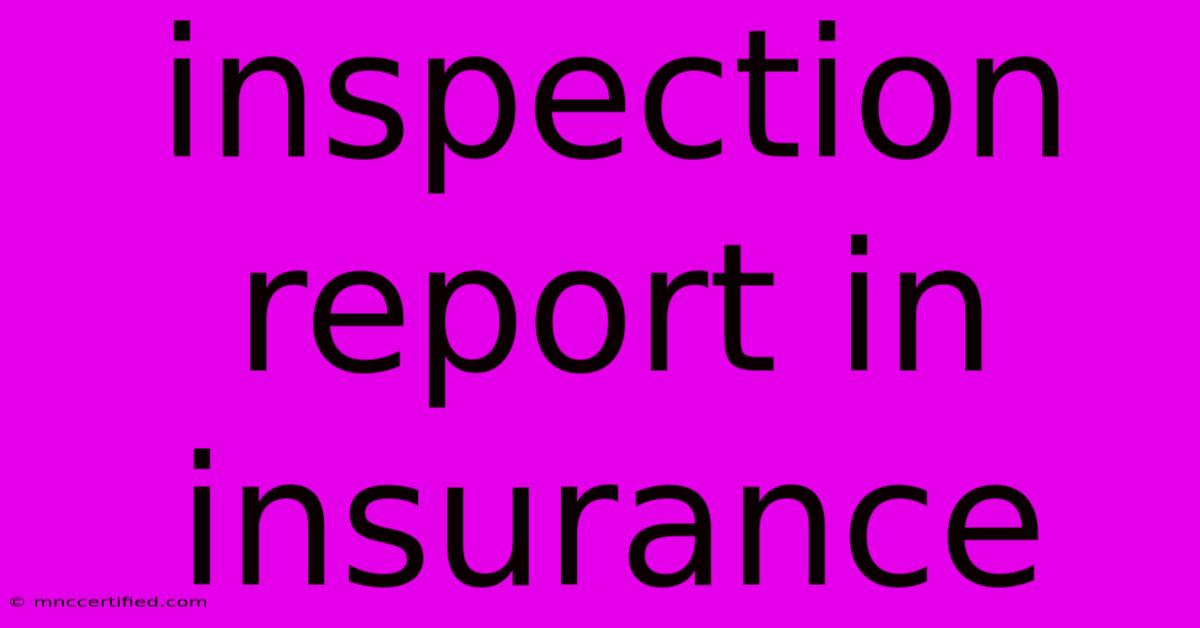Inspection Report In Insurance

Table of Contents
Understanding Insurance Inspection Reports: Your Guide to a Smooth Claim Process
An insurance inspection report is a crucial document that can significantly impact your insurance claim. Understanding its purpose, contents, and implications is vital for policyholders. This comprehensive guide will equip you with the knowledge to navigate the inspection process effectively and maximize your chances of a successful claim.
What is an Insurance Inspection Report?
An insurance inspection report is a detailed assessment of the property or incident that forms the basis of an insurance claim. Insurance companies use these reports to verify the validity of a claim, assess the extent of damage, and determine the appropriate compensation. The specifics of the report will vary depending on the type of claim (e.g., home insurance, auto insurance, health insurance) and the nature of the incident (e.g., fire damage, car accident, medical procedure).
Types of Insurance Inspections:
- Property Inspections: These are common for home, renters, and commercial insurance claims involving damage to property. Inspectors assess the extent of damage, identify the cause, and estimate repair costs.
- Auto Inspections: Following a car accident, an insurance adjuster might inspect the vehicle to determine the extent of the damage and its cause. This is crucial for determining liability and calculating repair costs.
- Medical Inspections: In health insurance, inspections might involve reviewing medical records and conducting independent medical examinations (IMEs) to verify the necessity and extent of medical treatment.
What Information is Included in an Insurance Inspection Report?
The content of an inspection report varies, but typically includes:
- Policyholder Information: This includes the policy number, the insured's name and address, and contact details.
- Date and Time of Inspection: A clear record of when the inspection took place.
- Description of the Incident: A detailed account of the event that led to the claim (e.g., fire, accident, theft).
- Damage Assessment: A thorough description of the damage, including photos and measurements. This section often includes specific details about the damaged property, its age, and its condition before the incident.
- Cause of Damage: The inspector's determination of what caused the damage. This is crucial for establishing liability.
- Repair or Replacement Costs: An estimate of the cost to repair or replace the damaged property. This will often include labor and material costs.
- Inspector's Conclusion and Recommendations: A summary of the inspector's findings and recommendations for resolving the claim.
How to Prepare for an Insurance Inspection
Being prepared for the inspection can significantly improve the efficiency and outcome of the process. Consider these steps:
- Gather Relevant Documentation: Collect all necessary documentation related to the claim, including photos, videos, receipts, and repair estimates.
- Secure the Property: If possible, secure the damaged area to prevent further damage and ensure the safety of the inspector.
- Be Present During the Inspection: Being present allows you to clarify any questions and provide additional information.
- Communicate Clearly and Honestly: Provide the inspector with accurate and truthful information.
- Ask Questions: Don't hesitate to ask questions about the inspection process and the inspector's findings.
Dispute Resolution if You Disagree with the Report
If you disagree with the findings of the inspection report, you have several options:
- Review the Report Carefully: Examine the report for any inaccuracies or omissions.
- Contact Your Insurance Adjuster: Discuss your concerns with your adjuster and provide any additional evidence supporting your position.
- Obtain a Second Opinion: Consider getting a second opinion from an independent appraiser or inspector.
- File a Formal Complaint: If your concerns remain unresolved, you may need to file a formal complaint with your insurance company or your state's insurance department.
Keywords for SEO:
insurance inspection report, insurance claim, property inspection, auto inspection, medical inspection, damage assessment, repair costs, insurance adjuster, dispute resolution, second opinion, claim process, home insurance, auto insurance, health insurance, independent appraiser, insurance company
By understanding the insurance inspection report process and proactively preparing for the inspection, you can significantly increase your chances of a smooth and successful claim process. Remember to maintain open communication with your insurance company and advocate for your rights throughout the process.

Thank you for visiting our website wich cover about Inspection Report In Insurance. We hope the information provided has been useful to you. Feel free to contact us if you have any questions or need further assistance. See you next time and dont miss to bookmark.
Featured Posts
-
Mobile Mechanic Insurance Cost
Nov 27, 2024
-
Arizona De Insured Certificate
Nov 27, 2024
-
Locate Eloise Sisley Beda Cortland Ohio
Nov 27, 2024
-
Does Insurance Cover Locksmith
Nov 27, 2024
-
Coles Past Pop Star Photos
Nov 27, 2024